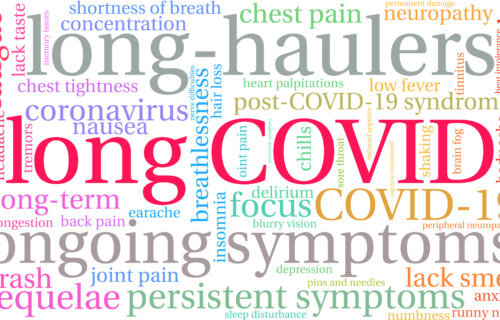WATKINSVILLE, Ga. — “Long COVID,” or the long-term symptoms which keep plaguing coronavirus patients well after their illnesses, may actually be the result of another virus coming back to life in their bodies. Researchers say nearly three-quarters of patients with COVID long hauler symptoms may be experiencing the reactivation of Epstein-Barr virus (EBV).
EBV, also called human herpesvirus 4, is one of the most common human viruses. According to the CDC, many people contract Epstein-Barr during childhood and it can lead to the development of infectious mononucleosis (mono) and other illnesses. Typical symptoms include fatigue, fever, sore throat, swollen lymph nodes, an enlarged spleen, swollen liver, and rashes.
“We ran Epstein-Barr virus serological tests on COVID-19 patients at least 90 days after testing positive for SARS-CoV-2 infection, comparing EBV reactivation rates of those with long COVID symptoms to those who never experienced long COVID symptoms,” says lead study author Jeffrey E. Gold of World Organization in a media release. “We found over 73% of COVID-19 patients who were experiencing long Covid symptoms were also positive for EBV reactivation.”
Gold adds over 95 percent of healthy adults will actually test positive for a latent EBV infection. To find it, doctors test for the presence of EBV VCA or EBV nuclear antigen 1 antibodies. When the virus reactivates however, doctors need to run further tests to find EBV EA-D and EBV VCA antibodies as well as circulating EBV DNA.
“We found similar rates of EBV reactivation in those who had long COVID symptoms for months, as in those with long COVID symptoms that began just weeks after testing positive for COVID-19. This indicated to us that EBV reactivation likely occurs simultaneously or soon after COVID-19 infection,” adds study co-author David J. Hurley, PhD, a molecular microbiologist at the University of Georgia.
COVID triggers Epstein-Barr more than other illnesses
Researchers note COVID-19 isn’t the only virus that can trigger a reoccurrence of Epstein-Barr. Other stressors and diseases can also reactivate the virus’s DNA however, the inflammation that COVID causes appears to make this relapse more likely.
Although EBV reactivating in coronavirus patients doesn’t explain every case of fatigue or brain fog, study authors now believe it’s a major factor in most long COVID cases. In an examination of 185 COVID-positive patients, one-third ended up having long hauler symptoms.
Researchers say this discovery may open the door to new COVID treatment strategies which address the possible reactivation of Epstein-Barr virus. The team adds it would be prudent to also test new COVID-19 patients for EBV, so doctors can work on reducing the intensity of the infection before long hauler symptoms emerge. Currently, there is no vaccine which prevents an Epstein-Barr infection.
“As evidence mounts supporting a role for EBV reactivation in the clinical manifestation of acute COVID-19, this study further implicates EBV in the development of long COVID,” concludes Lawrence S. Young, PhD, a virologist at the University of Warwick. “If a direct role for EBV reactivation in long COVID is supported by further studies, this would provide opportunities to improve the rational diagnosis of this condition and to consider the therapeutic value of anti-herpesvirus agents such as ganciclovir.”
The findings appear in the journal Pathogens.
